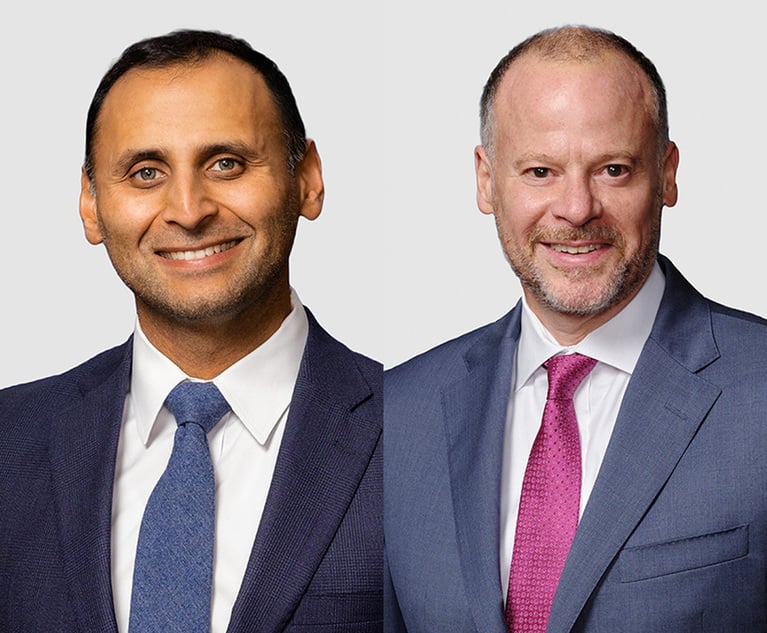Litigators of the Week: This Defense Dream Team Is on a Roll Fighting for Employers
In a span of less than two weeks, Orrick partners Lynne Hermle and Jessica Perry defeated class certification in closely watched gender bias cases against Microsoft and Twitter.
July 13, 2018 at 09:34 AM
6 minute read
 Jessica Perry and Lynne Hermle, Orrick Herrington & Sutcliffe
Jessica Perry and Lynne Hermle, Orrick Herrington & Sutcliffe
There may never have been a worse moment to be a corporate defendant battling a gender discrimination suit.
First came the spotlight on the Silicon Valley gender gap. Then Harvey Weinstein and the #MeToo movement inspired a corporate reckoning that has led to high-profile firings and lawsuits.
But even in a climate of outrage, Orrick, Herrington & Sutcliffe partners Lynne Hermle and Jessica Perry defeated class actions against Microsoft Corp. and Twitter Inc. that alleged the companies pay and promotion practices penalized women.
For that we recognize the Orrick team as our litigators of the week.
In the span of less than two weeks, separate judges in California and Washington denied motions to certify classes in the suits against both Microsoft and Twitter, essentially extinguishing cases that had been seen as a barometer for gender bias litigation in the tech industry. The Microsoft lawsuit sought to certify a class of more than 8,600 women and the Twitter case 130. Ultimately, the judges were not convinced that a common hiring practice or standard led to unequal promotion or pay among female workers at the company.
“Class certification is a big event in a case like this. It's the most important one. You are constantly thinking of evidence and what it's showing along the way,” Perry said in an interview Thursday. “As we got into the cases, it became clear that the theories they were pursuing weren't born out through in the evidence.”
Hermle agreed. “At the end of the day, the facts and the law clearly showed neither case should be certified,” Hermle said. “After so many years of litigation, we were pleased to see the judges dig into the voluminous record and thoughtfully analyze the issues to get to the right result.”
Hermle, an employment litigator whose stature rose after her 2015 trial win for Silicon Valley venture capital firm Kleiner Perkins Caufield Byers, argued against class certification. Perry, a Menlo Park, California-based employment partner and leader of the firm's litigation practices worldwide, was second chair. Both have taken on cases defending major clients in the tech sector.
Hermle, who's also based in Menlo Park, has said she planned to become a plaintiffs-side employment lawyer after graduating from law school but got a nudge into defense-side work and “never looked back.”
“I work with amazing clients, most of whom have great in-house counsel. I'm able to push for settlements and change when needed,” Hermle said in a 2015 interview with The Recorder, a Litigation Daily affiliate. “I lead a team of 10 tough women and serve on the management committee at Orrick, a firm with three women partners on the board.” (That team, according to an Orrick representative, now includes 12 women. Hermle has since joined the firm's board.)
In the lawsuit against Microsoft, a class of more than 8,600 former and current female employees sought to join together, claiming the company's pay and promotion practices favored men. The workers are represented by a team from Outten & Golden and Lieff Cabraser Heimann & Bernstein.
U.S. District Judge James L. Robart in Washington federal court in Seattle denied class certification on June 25, ruling a uniform policy for pay and promotion did not tie the women together.
The case against Twitter centered around only promotion practices, and attorneys argued for a class of about 130 female engineers to join the lawsuit, which claimed that a “boys club” culture enabled an unfair promotion system.
Jason Lohr of San Francisco's Lohr Ripamonti & Segarich represents the employees. Ruling July 3, San Francisco Superior Court Judge Mary Wiss denied class certification on grounds that there was not enough commonality or a uniform reason for a disparity.
Perry said the cases, both filed in 2015, had similarities and overlapping themes. Both cases ultimately collapsed under the weight of Walmart v. Dukes, because plaintiffs were unable to tie an alleged gender disparity to specific or uniform policies at the companies.
During oral argument in the Microsoft case, Robart telegraphed a likely win for the Orrick attorneys. Lieff Cabraser partner Kelly Dermody told the judge that Microsoft managers weren't following uniform guidance in their decisions to promote or pay employees. The judge said that admission drove “a wooden stake through the heart” of her argument.
In addition to the Microsoft and Twitter cases, lawsuits targeting gender bias are ongoing against other tech giants, including Google and Oracle. A lawsuit against Uber Technologies recently settled. Hermle said she expects plaintiffs will continue to press cases targeting pay and promotion practices.
She said the Twitter and Microsoft cases could be instructive for the discrimination litigation landscape moving forward.
“I think the courts recognize that class actions simply are not an appropriate vehicle for highly individualized discrimination claims. There are some situations where a disparate impact theory may be the appropriate vehicle, like if there is a testing requirement that screens out certain candidates—a height or weight requirement for example, but it isn't the right vehicle when you are dealing with individual managers evaluating job performance in light of unique roles and different contributions.”
Hermle said her background defending other major companies in Silicon Valley helped shape her approach to defending Microsoft and Twitter. She said understanding the pace of innovation and type of work done by engineers, for example, gave her team a leg up in explaining the companies' performance management systems and how decisions are actually made.
She added that with litigation on these issues, she has seen a concerted effort by clients to enhance policies and practices to promote recruitment, retention and advancement of women—despite the challenges in the pipeline.
“So, I think there's real change happening,” Hermle said. “But it's not happening through meritless suits.”
This content has been archived. It is available through our partners, LexisNexis® and Bloomberg Law.
To view this content, please continue to their sites.
Not a Lexis Subscriber?
Subscribe Now
Not a Bloomberg Law Subscriber?
Subscribe Now
NOT FOR REPRINT
© 2025 ALM Global, LLC, All Rights Reserved. Request academic re-use from www.copyright.com. All other uses, submit a request to [email protected]. For more information visit Asset & Logo Licensing.
You Might Like
View All
Amid the Tragedy of the L.A. Fires, a Lesson on the Value of Good Neighbors

Why the Founders of IP Boutique Fisch Sigler Are Stepping Away From the Law and Starting an AI Venture

Like a Life Raft: Ben Brafman Reflects on Nearly 50 Years as a Defense Attorney

Trying a Case for Abu Ghraib Detainees Two Decades After Abuse
Trending Stories
Who Got The Work
J. Brugh Lower of Gibbons has entered an appearance for industrial equipment supplier Devco Corporation in a pending trademark infringement lawsuit. The suit, accusing the defendant of selling knock-off Graco products, was filed Dec. 18 in New Jersey District Court by Rivkin Radler on behalf of Graco Inc. and Graco Minnesota. The case, assigned to U.S. District Judge Zahid N. Quraishi, is 3:24-cv-11294, Graco Inc. et al v. Devco Corporation.
Who Got The Work
Rebecca Maller-Stein and Kent A. Yalowitz of Arnold & Porter Kaye Scholer have entered their appearances for Hanaco Venture Capital and its executives, Lior Prosor and David Frankel, in a pending securities lawsuit. The action, filed on Dec. 24 in New York Southern District Court by Zell, Aron & Co. on behalf of Goldeneye Advisors, accuses the defendants of negligently and fraudulently managing the plaintiff's $1 million investment. The case, assigned to U.S. District Judge Vernon S. Broderick, is 1:24-cv-09918, Goldeneye Advisors, LLC v. Hanaco Venture Capital, Ltd. et al.
Who Got The Work
Attorneys from A&O Shearman has stepped in as defense counsel for Toronto-Dominion Bank and other defendants in a pending securities class action. The suit, filed Dec. 11 in New York Southern District Court by Bleichmar Fonti & Auld, accuses the defendants of concealing the bank's 'pervasive' deficiencies in regards to its compliance with the Bank Secrecy Act and the quality of its anti-money laundering controls. The case, assigned to U.S. District Judge Arun Subramanian, is 1:24-cv-09445, Gonzalez v. The Toronto-Dominion Bank et al.
Who Got The Work
Crown Castle International, a Pennsylvania company providing shared communications infrastructure, has turned to Luke D. Wolf of Gordon Rees Scully Mansukhani to fend off a pending breach-of-contract lawsuit. The court action, filed Nov. 25 in Michigan Eastern District Court by Hooper Hathaway PC on behalf of The Town Residences LLC, accuses Crown Castle of failing to transfer approximately $30,000 in utility payments from T-Mobile in breach of a roof-top lease and assignment agreement. The case, assigned to U.S. District Judge Susan K. Declercq, is 2:24-cv-13131, The Town Residences LLC v. T-Mobile US, Inc. et al.
Who Got The Work
Wilfred P. Coronato and Daniel M. Schwartz of McCarter & English have stepped in as defense counsel to Electrolux Home Products Inc. in a pending product liability lawsuit. The court action, filed Nov. 26 in New York Eastern District Court by Poulos Lopiccolo PC and Nagel Rice LLP on behalf of David Stern, alleges that the defendant's refrigerators’ drawers and shelving repeatedly break and fall apart within months after purchase. The case, assigned to U.S. District Judge Joan M. Azrack, is 2:24-cv-08204, Stern v. Electrolux Home Products, Inc.
Featured Firms
Law Offices of Gary Martin Hays & Associates, P.C.
(470) 294-1674
Law Offices of Mark E. Salomone
(857) 444-6468
Smith & Hassler
(713) 739-1250






